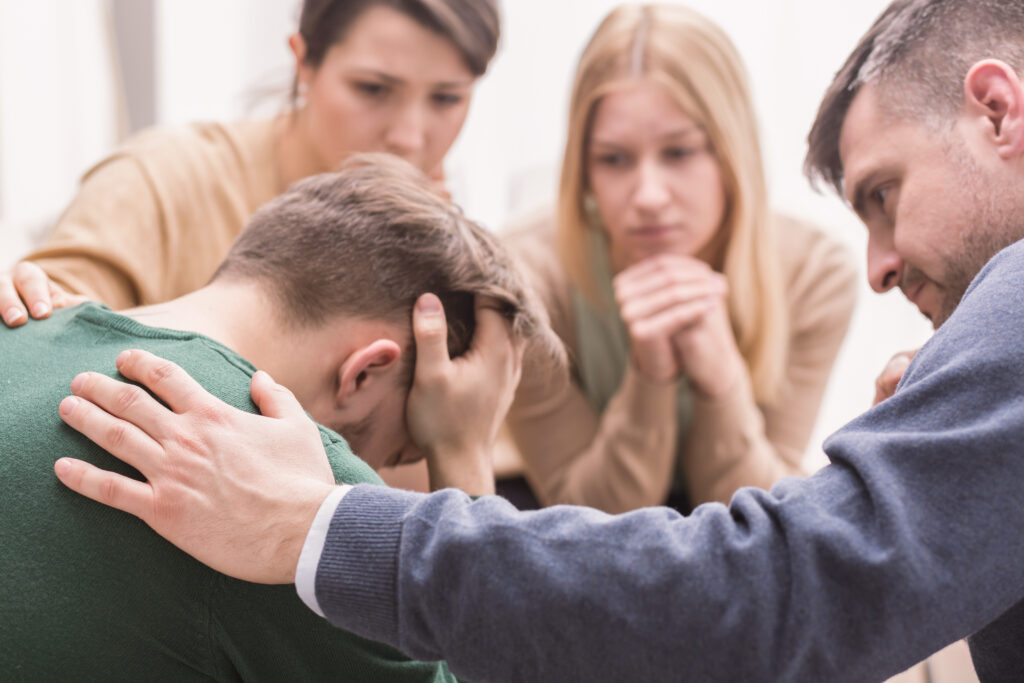
The loss of a loved one is probably one of the most painful experiences that life has to offer. Suddenly, nothing is the same as it once was. Nevertheless, after a while most people manage to look positively into the future again. The pain of loss gives way to fond and beautiful memories of the deceased. This process is called coping with grief. In the following, we would like to show you how the grieving process works and how you can learn to deal with the pain of loss.
Basically, every person grieves in his or her own way. It is therefore difficult to formulate a universally valid definition of grief. In simple terms, it is an intense emotional pain that is caused by a loss or a Misfortune is triggered.
If one speaks of mourning, this is predominantly associated with the death of a loved one. But also the loss of prosperity, health or even a Separation can cause feelings of grief. To grieve means to lose something important forever.
As painful as mourning may be, it is nevertheless important in order to heal again mentally. Only when the mourning process is allowed to take place is it possible to restore inner balance.
Family and friends play a crucial role in coping with grief. Confiding in a close person and remembering the deceased together can be extremely healing.
Unfortunately, not all people get the necessary emotional support from their social environment. In this case, professional contact points can be a good option. These include, for example, church pastors, bereavement networks, self-help groups and telephone counselling. If the pressure of suffering is very intense, a psychologist can also be consulted.
According to the renowned psychologist Dr. Doris Wolf, who has written numerous guidebooks on the subject of coping with grief (e.g. "Losing a loved one," PAL Verlagsgesellschaft), it takes about three to five years for the acute emotional pain to pass.
However, this time specification should only be regarded as a rough guide! How long it actually takes to come to terms with grief can vary greatly from person to person. Sometimes grief that was thought to have been processed can even flare up again decades later, if the mourner is reminded of the loss situation by something.
The grieving process is rarely linear. Although there are different stages of grief, which we will look at in more detail later, regressions are completely normal. A so-called residual grief remains even after successful mourning. However, this no longer determines the life of the bereaved.
According to an epidemiological study conducted by Prof. Dr. med. Annette Kersting, a specialist in psychosomatic medicine, around 6.7 % of all mourners in Germany develop a pathological course of mourning. This means that the period of intense duration as well as the acute grief symptomatology lasts for years or even decades.

The mourning process can be divided into four stages. Let's take a closer look at these.
If the death of a close relative or another bad event has occurred, most people cannot believe it at first. The event seems surreal, as if one would wake up from a nightmare at any moment.
Heart and mind refuse to accept the event as true. accept. This is a natural protection of our psyche, in order to be able to work on the overstraining stressful emotions not to break.
Once the denial phase is over, violent emotions push to the surface. The pain and despair are felt very intensely. Often anger plays a decisive role. The loved one is angry at the injustice of the world that has taken away his or her dearest. Some even feel abandoned by the deceased. Self-reproach can also occur.
The intense emotions also make themselves felt physically. Many mourners suffer from sleep disturbances and loss of appetite during this phase. Many also feel listless. Real life sometimes seems like a movie in which one is merely an extra. Thoughts constantly revolve around the loss suffered.
After a while, the mourner gradually begins to reorient himself. This includes first allowing himself to think again about a future without the deceased. The mourner has now accepted the situation.
The pain is still a constant companion, but it no longer feels so all-encompassing and intense. The bereaved person may even be able to laugh again. The physical symptoms of grief also gradually subside.
The mourner has regained his physical and mental balance. When he thinks of the deceased, this fills him with melancholy, but the focus is on the beautiful memories. The loved one always remains a part of life, but grief no longer interferes with planning for the future. The mourner has restructured his everyday life.

In the course of life, everyone is confronted with grief sooner or later. When it comes to dealing with pain and loss, there is no right or wrong. Each person grieves in his or her own way. While some people have a great need to talk and find crying liberating, others are more quiet and want to withdraw for a while. Both are fine.
It is important to allow grief to be dealt with at all. If you repress it, it can become pathological. This means that the symptoms lead to depression and the bereaved person loses his or her own courage to face life in the long term. The following strategies can help you to prevent this from happening to you:
It doesn't matter if you want to talk about your feelings with other people or if you prefer to shout your sadness out loud in the forest: Everything is allowed. Physical activity can also help relieve emotional stress. If you are creatively inclined, expressing your grief through painting or writing is a good option. The main thing is to find a (healthy) outlet for your emotions.
Do not remain alone with your grief. Especially if the circumstances of the loss were particularly tragic (e.g., death by suicide, loss of a child), it can help to exchange ideas with people who are in the same situation. There are now support groups in almost every major city.
A farewell ritual is particularly important in order to realize the loss and ultimately to be able to cope with it better. Many relatives who were able to hold the dying person's hand until the end are better able to cope with the grief afterwards.
If you were not able to do this, you could consider an alternative farewell ritual. Visit a place that reminds you of the deceased or write him a letter. Some people also like to set up a small memorial corner in their home with a nice photo.
Even if it seems difficult or even inappropriate, distraction can take the pressure off your mind. A time marked by loss and grief can also open up new opportunities. Maybe now is the time to finally take care of your professional goals? Maybe there's a hobby you've always wanted to try?
The desire to be relieved of the deep pain, at least for a few moments, is understandable. However, do not make the mistake of trying to relieve yourself with tranquilizers, alcohol or sweets. These mechanisms are not suitable for coping with grief, but only cause you an additional problem.
As mentioned earlier, support in coping with grief is invaluable. Also a professional Coaching can help you deal with the pain. The first step is to name the grief: What feelings does it trigger in you? Where in your body can you perceive these feelings? For example, if you can locate the heart, now go deeper and ask yourself, "That's like what's there?" With this simple questioning technique, you can give your feeling more and more of a "face." Is it sadness, anger, Fear, helplessness or loneliness that hides behind the lump in your throat or the heaviness on your shoulders, for example?
Some people feel a stone in their stomach, while others have a tight throat. Sometimes it also feels as if an iron ring has been placed around the heart. Making grief tangible helps you to feel it through with targeted coaching techniques, but also to alleviate it at the same time.
Often negative Beliefs This is the reason for the intense emotional stress you are experiencing while coping with grief. Perhaps someone taught you in childhood that you shouldn't show emotions or that you look weak when you cry? All of this can complicate the grieving process if you continue to hold on to these old thoughts. In the context of a Coachings you learn to dissolve these blocks in your mind and to focus on your strengths again.

